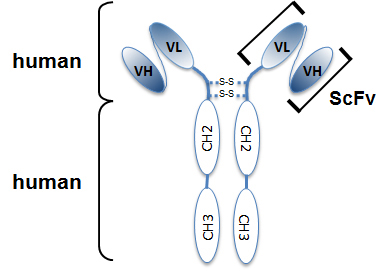PEDF (human) (rec.)
AG-40B-0077
Protein IDP36955
Product group Proteins / Signaling Molecules
Overview
- SupplierAdipoGen Life Sciences
- Product NamePEDF (human) (rec.)
- Delivery Days Customer10
- CertificationResearch Use Only
- Concentration0.1 mg/ml
- Estimated Purity>95%
- Gene ID5176
- Target nameSERPINF1
- Target descriptionserpin family F member 1
- Target synonymsEPC-1, OI12, OI6, PEDF, PIG35, pigment epithelium-derived factor, alpha-2 antiplasmin, cell proliferation-inducing gene 35 protein, serine (or cysteine) proteinase inhibitor, clade F (alpha-2 antiplasmin, pigment epithelium derived factor), member 1, serpin peptidase inhibitor, clade F (alpha-2 antiplasmin, pigment epithelium derived factor), member 1, testis tissue sperm-binding protein Li 70n
- Protein IDP36955
- Protein NamePigment epithelium-derived factor
- Scientific DescriptionPigment epithelium-derived factor (PEDF) is a 47 kDa secreted glycoprotein that belongs to the non-inhibitory serpin family group. PEDF is widely expressed in adult and foetal tissues, including brain, spinal cord, plasma, bone, prostate, pancreas, heart and lung. PEDF acts as an angiogenesis inhibitor with neurotrophic, immunomodulation and antitumor properties. It functions as anti-angiogenic agent by counterbalancing the proangiogenic effect of VEGF. PEDF is one of the most abundant proteins released by adipocytes and induces insulin resistance in adipocytes and human skeletal muscle cells. Recently, it has been reported that PEDF is sufficient to maintain the self-renewal of pluripotent human embryonic stem cells. - Protein. Human PEDF (aa 20-418) is fused at the C-terminus of to a FLAG®-tag. Source: CHO cells. Endotoxin content: 95% (SDS-PAGE). Pigment epithelium-derived factor (PEDF) is a 47 kDa secreted glycoprotein that belongs to the non-inhibitory serpin family group. PEDF is widely expressed in adult and foetal tissues, including brain, spinal cord, plasma, bone, prostate, pancreas, heart and lung. PEDF acts as an angiogenesis inhibitor with neurotrophic, immunomodulation and antitumor properties. It functions as anti-angiogenic agent by counterbalancing the proangiogenic effect of VEGF. PEDF is one of the most abundant proteins released by adipocytes and induces insulin resistance in adipocytes and human skeletal muscle cells. Recently, it has been reported that PEDF is sufficient to maintain the self-renewal of pluripotent human embryonic stem cells.
- Storage Instruction-20°C,2°C to 8°C
- UNSPSC41116100
- SpeciesHuman


